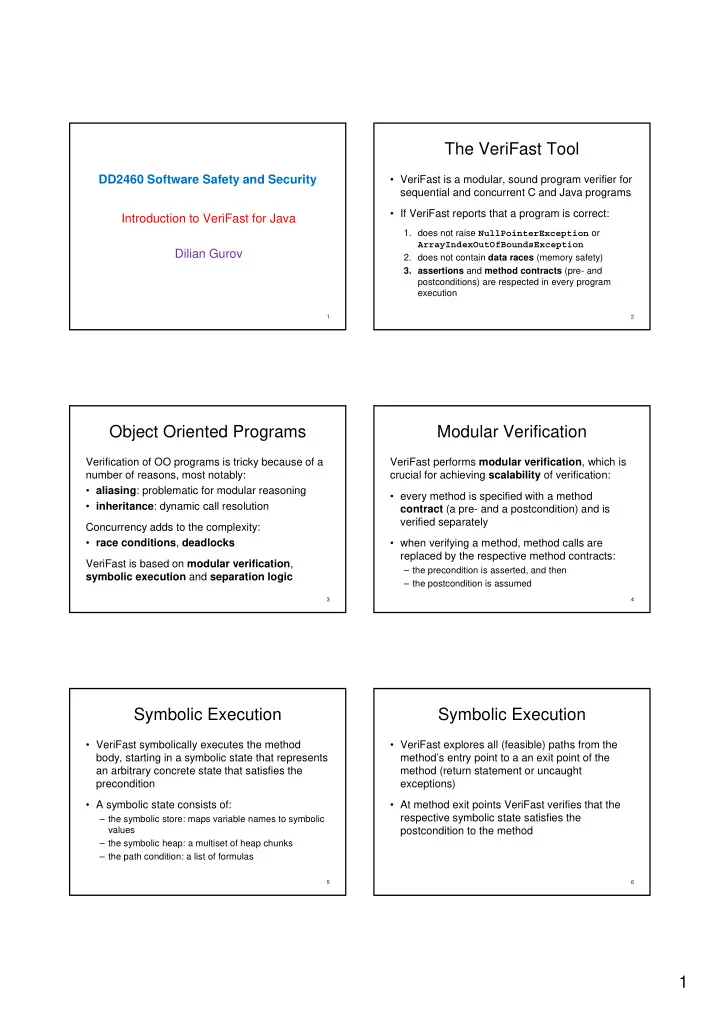

The VeriFast Tool DD2460 Software Safety and Security • VeriFast is a modular, sound program verifier for sequential and concurrent C and Java programs • If VeriFast reports that a program is correct: Introduction to VeriFast for Java 1. does not raise NullPointerException or ArrayIndexOutOfBoundsException Dilian Gurov 2. does not contain data races (memory safety) 3. assertions and method contracts (pre- and postconditions) are respected in every program execution 1 2 Object Oriented Programs Modular Verification Verification of OO programs is tricky because of a VeriFast performs modular verification , which is number of reasons, most notably: crucial for achieving scalability of verification: • aliasing : problematic for modular reasoning • every method is specified with a method • inheritance : dynamic call resolution contract (a pre- and a postcondition) and is verified separately Concurrency adds to the complexity: • race conditions , deadlocks • when verifying a method, method calls are replaced by the respective method contracts: VeriFast is based on modular verification , – the precondition is asserted, and then symbolic execution and separation logic – the postcondition is assumed 3 4 Symbolic Execution Symbolic Execution • VeriFast symbolically executes the method • VeriFast explores all (feasible) paths from the body, starting in a symbolic state that represents method’s entry point to a an exit point of the an arbitrary concrete state that satisfies the method (return statement or uncaught precondition exceptions) • A symbolic state consists of: • At method exit points VeriFast verifies that the respective symbolic state satisfies the – the symbolic store: maps variable names to symbolic postcondition to the method values – the symbolic heap: a multiset of heap chunks – the path condition: a list of formulas 5 6 1
Separation Logic Permissions • To handle the problems of aliasing and data • Memory safety is guaranteed by explicitly races due to shared memory concurrency, specifying the heap chunks that are used VeriFast employs separation logic (required/ consumed and ensured/produced) at a given place of the program • the program memory (heap) is conceptually broken down into separate chunks (or more • Permissions themselves can be broken down precisely, permissions to access chunks) that into so-called fractional permissions to allow are passed during method calls and returns, or multiple read access to memory distributed between concurrent threads • Permissions are represented by fractions between 0 and 1, only 1 giving write access 7 8 Data Races Data Abstraction • A data race occurs when two threads • One can define own predicates to be concurrently access the same memory location used in specifications and at least one of these accesses is a write – to make specifications more concise and abstract access – to capture object invariants – to encapsulate parts of the heap, for example the • VeriFast prevents data races by enforcing the private fields of objects (to get access to its parts one system invariant that for each memory location, has to ”open” the predicate) the total sum of the fractions of the permissions is at most 1 • Produced/ensured predicates create symbolic values during symbolic execution 9 10 Inductive Data Types More Advanced Features • Can be used to present abstract views of • Fixpoint Functions programmer-defined data types – definitions of functions over inductive data types – follow the principle of structural induction • Specify such data types by relating (with a predicate) the data type to its abstract view • Lemmas – contracts for pure functions (in specifications) • for example, lists can be used as abstract views of stacks • Inheritance – contracts for Java interfaces – matched against implementation contracts 11 12 2
A Java Chat Server • Member: a member of a chat room – nickname, output stream • Room: a chat room – list of present members • Session: a chat session per member connecting through a socket – room, room lock, socket • Program: constructs one chat room, a lock and a server socket, creates a new thread and session for each incoming client connection 13 3
Recommend
More recommend